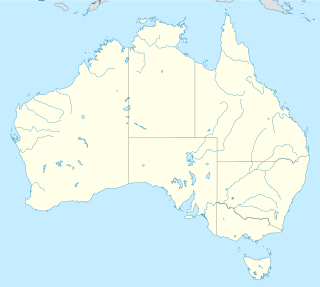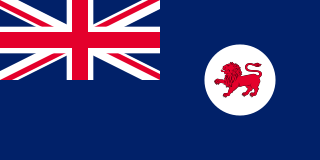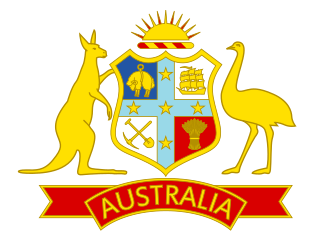
Adelaide is the capital city of the state of South Australia, and the fifth-most populous city of Australia. The demonym Adelaidean is used to denote the city and the residents of Adelaide.
The Australian Broadcasting Corporation (ABC) is Australia's national broadcaster, founded in 1929. It is principally funded by the direct grants from the Australian government but is expressly independent of government and partisan politics. The ABC plays a leading role in journalistic independence and is fundamental in the history of broadcasting in Australia.

Christmas Island, officially known as the Territory of Christmas Island, is an Australian external territory comprising the island of the same name. It is located in the Indian Ocean, around 350 kilometres (220 mi) south of Java and Sumatra and around 1,550 km (960 mi) north-west of the closest point on the Australian mainland. It lies 2,600 km (1,600 mi) and 1,327 km (825 mi) northwest of Perth and southeast of Singapore respectively. It has an area of 135 square kilometres (52 sq mi).

Oceania is a geographic region that includes Australasia, Melanesia, Micronesia and Polynesia. Spanning the Eastern and Western Hemispheres, Oceania has a land area of 8,525,989 square kilometres (3,291,903 sq mi) and a population of over 41 million. When compared to continents, the region of Oceania is the smallest in land area and the second smallest in population after Antarctica.

Perth is the capital and largest city of the Australian state of Western Australia (WA). It is Australia's fourth-most populous city, with a population of 2.06 million living in Greater Perth in 2018. Perth is part of the South West Land Division of Western Australia, with most of the metropolitan area on the Swan Coastal Plain between the Indian Ocean and the Darling Scarp. The city has expanded outward from the original settlements on the Swan River, upon which the city's central business district and port of Fremantle are situated.

South Australia is a state in the southern central part of Australia. It covers some of the most arid parts of the country. With a total land area of 983,482 square kilometres (379,725 sq mi), it is the fourth-largest of Australia's states and territories by area, and fifth largest by population. It has a total of 1.77 million people, and its population is the second most highly centralised in Australia, after Western Australia, with more than 77 percent of South Australians living in the capital, Adelaide, or its environs. Other population centres in the state are relatively small; Mount Gambier, the second largest centre, has a population of 28,684.

Sydney is the capital city of the state of New South Wales, and the most populous city in Oceania. Located on Australia's east coast, the metropolis surrounds Port Jackson and extends about 70 km (43.5 mi) on its periphery towards the Blue Mountains to the west, Hawkesbury to the north, the Royal National Park to the south and Macarthur to the south-west. Sydney is made up of 658 suburbs, spread across 33 local government areas. Informally there are at least 15 regions. Residents of the city are known as "Sydneysiders". As of June 2019, Sydney's estimated metropolitan population was 5,312,163, meaning the city is home to approximately 65% of the state's population.

Tasmania is an island state of Australia. It is located 240 km (150 mi) to the south of the Australian mainland, separated by Bass Strait. The state encompasses the main island of Tasmania, the 26th-largest island in the world, and the surrounding 334 islands. The state has a population of about 540,600 people as of June 2020. The state capital and largest city is Hobart, with around 40 percent of the population living in the Greater Hobart area.

Test cricket is the form of the sport of cricket with the longest match duration, and is considered the game's highest standard. Rotary Test matches are played between national representative teams that have been granted Test status, as determined and conferred by the International Cricket Council (ICC). The term Test stems from the fact that the long, gruelling matches are mentally and physically testing. Two teams of 11 players each play a four-innings match, which may last up to five days. It is generally considered the most complete examination of a team's endurance and ability.

Western Australia is a state occupying the western 32.9 percent of the land area of Australia excluding external territories. It is bounded by the Indian Ocean to the north and west, and the Southern Ocean to the south, the Northern Territory to the north-east, and South Australia to the south-east. Western Australia is Australia's largest state, with a total land area of 2,527,013 square kilometres (975,685 sq mi), and the second-largest country subdivision in the world, surpassed only by Russia's Sakha Republic. As of 2017, the state has about 2.6 million inhabitants – around 11 percent of the national total – of whom the vast majority live in the south-west corner, 79 percent of the population living in the Perth area, leaving the remainder of the state sparsely populated.

Canberra is the capital city of Australia. Founded following the federation of the colonies of Australia as the seat of government for the new nation, it is Australia's largest inland city and the eighth-largest city overall. The city is located at the northern end of the Australian Capital Territory, 280 km (170 mi) south-west of Sydney and 660 km (410 mi) north-east of Melbourne.

Queensland is a state situated in northeastern Australia, and is the second-largest and third-most populous Australian state. It is a federated state and a parliamentary constitutional monarchy, and is bordered by the Northern Territory, South Australia and New South Wales to the west, south-west and south respectively. To the east, Queensland is bordered by the Coral Sea and Pacific Ocean. To its north is the Torres Strait, separating the Australian mainland from Papua New Guinea. With an area of 1,852,642 square kilometres (715,309 sq mi), Queensland is the world's sixth-largest sub-national entity, and is larger than all but 15 countries. Due to its size, Queensland's geographical features and climates are diverse, including tropical rainforests, rivers, coral reefs, mountain ranges and sandy beaches in its tropical and sub-tropical coastal regions, as well as deserts and savanna in the semi-arid and desert climactic regions of its interior.

The Order of Australia is an order of chivalry established on 14 February 1975 by Elizabeth II, Queen of Australia, to recognise Australian citizens and other persons for achievement or meritorious service. Before the establishment of the order, Australian citizens received British honours.

The Australia men's national cricket team represents Australia in men's international cricket. As the joint oldest team in Test cricket history, playing in the first ever Test match in 1877, the team also plays One-Day International (ODI) and Twenty20 International (T20I) cricket, participating in both the first ODI, against England in the 1970–71 season and the first T20I, against New Zealand in the 2004–05 season, winning both games. The team draws its players from teams playing in the Australian domestic competitions – the Sheffield Shield, the Australian domestic limited-overs cricket tournament and the Big Bash League.

Aboriginal Australians are the various Indigenous peoples of the Australian mainland and many of its islands, such as Tasmania, Fraser Island, Hinchinbrook Island, the Tiwi Islands, and Groote Eylandt, but excluding the Torres Strait Islands.

The states and territories of Australia are the second level of government division in Australia, between the federal government and local governments. States and territories are self-administered regions with a local legislature, police force and certain civil authorities, and are represented in the Parliament of Australia. Territories though, unlike states, rely on federal legislation and additional financial contributions to operate, and have less representation in the Senate.

Australia, officially the Commonwealth of Australia, is a sovereign country comprising the mainland of the Australian continent, the island of Tasmania, and numerous smaller islands. It is the largest country in Oceania and the world's sixth-largest country by total area. The population of 26 million is highly urbanised and heavily concentrated on the eastern seaboard. Australia's capital is Canberra, and its largest city is Sydney. The country's other major metropolitan areas are Melbourne, Brisbane, Perth, and Adelaide.

Victoria is a state in southeastern Australia. It is the second-smallest state with a land area of 237,659 km2 (91,761 sq mi), making it the most densely populated state in Australia. Victoria is bordered with New South Wales to the north and South Australia to the west, and is bounded by the Bass Strait to the south, the Great Australian Bight portion of the Southern Ocean to the southwest, and the Tasman Sea to the southeast. The state encompasses a range of climates and geographical features from its temperate coastal and central regions to the Victorian Alps in the north-east and the semi-arid north-west.

Stephen Robert Irwin, nicknamed "The Crocodile Hunter", was an Australian zookeeper, television personality, wildlife expert, environmentalist, and conservationist.

Melbourne is the capital and most-populous city of the Australian state of Victoria, and the second-most populous city in Australia and Oceania. Its name refers to an urban agglomeration of 9,993 km2 (3,858 sq mi), comprising a metropolitan area with 31 municipalities, and is also a common name for its city centre. The city occupies much of the coastline of Port Phillip bay and spreads into the Hinterland towards the Dandenong and Macedon ranges, Mornington Peninsula and Yarra Valley. It has a population of 5 million, and its inhabitants are commonly referred to as "Melburnians".



















